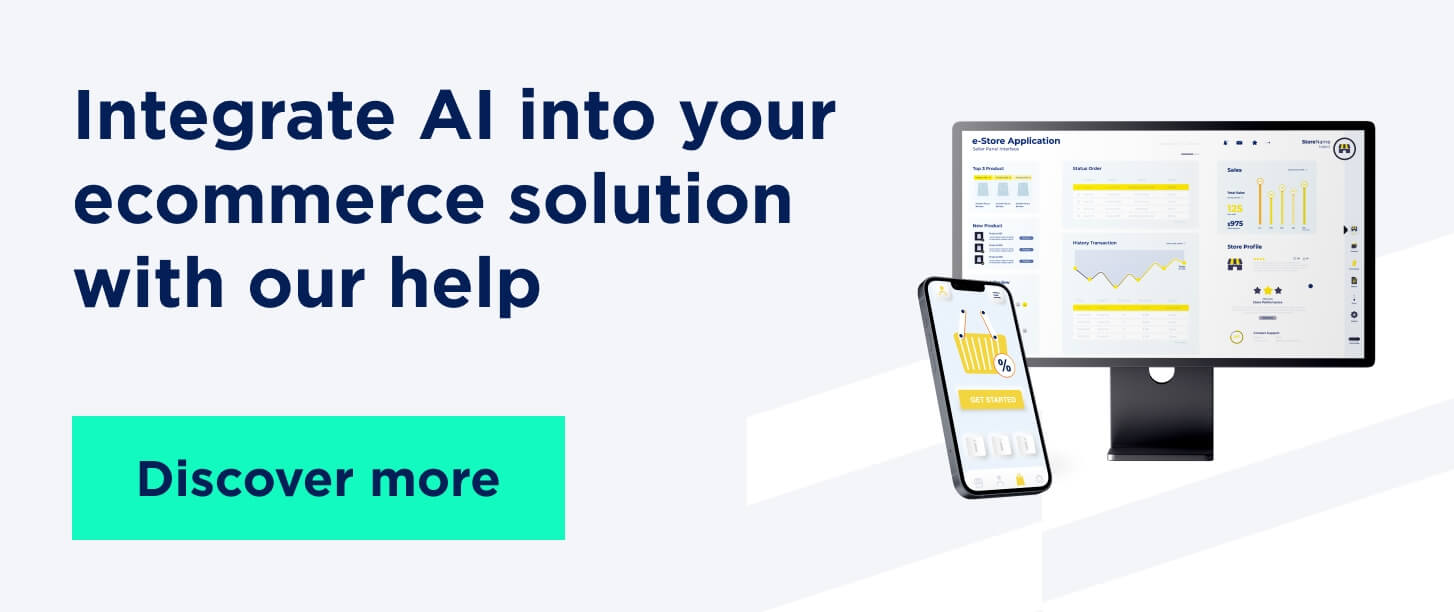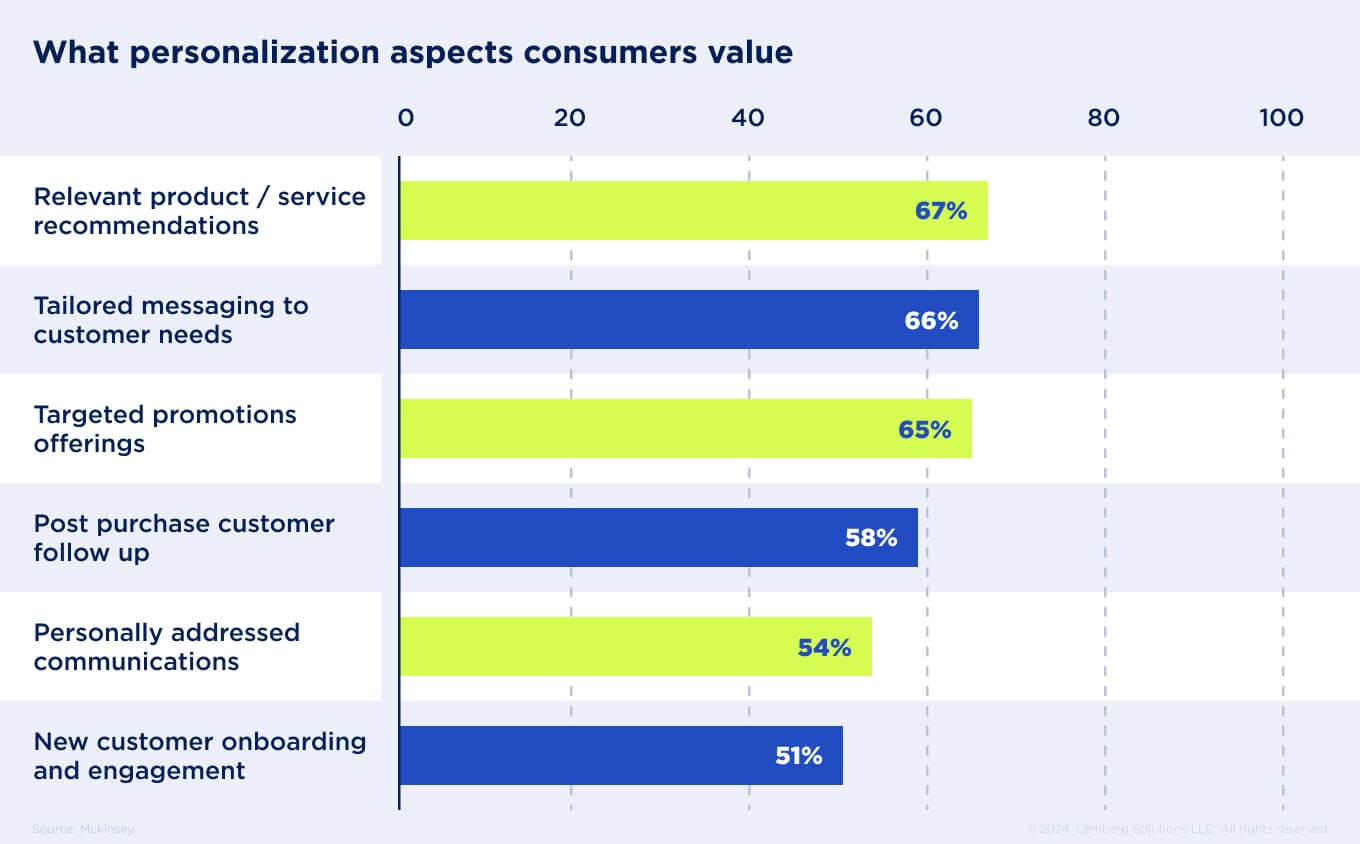AI reshapes the ecommerce field by enhancing customer experience and improving business operations. In this article, we explore how AI in ecommerce can help you optimize prices, enhance personalization, improve product search for end users, forecast demand, and automate customer support.
We offer five ideas for AI implementation to boost your ecommerce website. Dive in!
What is AI in ecommerce
AI in ecommerce relates to applying AI solutions within online ecommerce platforms to enhance different elements of the ecommerce experience for businesses and end users. AI for ecommerce includes using ML algorithms, natural language processing (NLP), computer vision, and other AI techniques to automate processes, personalize user experiences, improve product recommendations, optimize pricing strategies, and enhance customer service.

Benefits of implementing AI in commerce
According to Cisco report, 83% of companies are convinced that AI is a strategic priority for them, while 84% believe that AI will help them achieve and maintain a competitive advantage.

Here is how you can benefit from integrating artificial intelligence in ecommerce:
Price optimization
With AI-powered software and its ability to analyze large datasets, you are more likely to achieve pricing optimization. AI-enabled dynamic pricing allows businesses to change prices according to current supply and demand. For example, if a competitor's supply of a particular item is running low, AI algorithms can promptly alert businesses about the opportunity to increase prices. By leveraging AI for pricing optimization, businesses can enhance profitability, maintain competitiveness, and respond effectively to market dynamics, ultimately driving revenue growth and market success.
Enhanced personalization
According to a 2021 report by McKinsey, personalization, fueled by data and analytics, strengthens user and brand connection and increases user loyalty. AI significantly improves ecommerce personalization. With AI-driven technology, you can effectively capture and analyze customer data in real time. This way, your website also plays the role of an advisor, offering tailored product recommendations and discounts.
As a result, businesses grow their sales levels. McKinsey's research reveals that companies leveraging personalization receive a 40% profit increase. 71% of customers expect businesses to provide a satisfactory level of personalization. AI-powered personalization allows ecommerce businesses to build stronger connections with consumers, drive sales, and thrive in today's competitive market landscape.

Improved product search for customers
AI-driven development in natural language processing (NLP) improved product search capabilities within an ecommerce platform. NLP enables a more accurate interpretation of user queries, ensuring that search results align closely with their intentions. Moreover, AI-powered features such as synonym recognition, phrase completion, and spell-checking refine search accuracy.
Among other benefits of AI in ecommerce, cutting-edge AI technology — vectors, takes search optimization to the next level. Ecommerce companies can combine keyword and vector-based search methodologies within a single user query. This approach significantly improves search accuracy and relevance. Furthermore, AI enables visual search, allowing users to search by images and receive suggestions for visually similar products. By delivering personalized search experiences, AI-powered website search leads to a competitive edge in the ecommerce field.
Customer support automation
AI chatbots can help automate the customer support process. Such chatbots rely on NLP to understand and address customer inquiries effectively. Companies can enhance the chatbot solution knowledge base, evolving into more efficient support technology.
Chatbots offer round-the-clock availability and a wealth of information to answer the majority of customers' questions. They excel at handling routine queries, allowing support employees to focus on more complex issues. Recent advancements in AI for ecommerce have further refined chatbots' capabilities, increasing consumer trust.
Read more: Generative AI Examples: Real Solutions by Our Data Science Team
Demand forecasting
Demand forecasting with AI includes using ML algorithms to analyze customer sales data and market trends for improved inventory management. AI ensures that predicting future demand for products or services becomes more accurate. Such an approach enables ecommerce companies to optimize inventory levels, preventing overstocking and understocking, thus enhancing supply chain efficiency.
Furthermore, demand forecasting helps determine market trends and opportunities, empowering ecommerce companies to adapt business strategies and maintain a competitive edge. With AI technology, companies can significantly enhance forecasting accuracy, enabling more thorough decision-making processes. By embracing AI-powered demand forecasting, organizations can streamline operations, minimize costs, and capitalize on emerging market trends.
How businesses use AI in ecommerce
Exploring various AI in ecommerce examples, you will understand the innovative strategies other businesses employ to enhance customer experiences, optimize operations, and drive sales in the digital marketplace.
Defective items detection
AI revolutionizes the way Amazon detects defective items in their packing warehouses. With the help of AI technology, Amazon employees can find damaged products before they are shipped to customers, improving customer shopping experience.
Traditionally, multiple employees would visually inspect products for damages. Being a time-consuming process, it is also error-prone since employees don't keep this task in mind due to the rarity of damaged items in Amazon's vast inventory.
To automate this process, a team of data scientists leveraged ML and computer vision to create an AI system that analyzes scans of every item passing through the warehouse. The system compares them to reference images to identify patterns that indicate damage. By continuously learning and improving from its analyses, the AI system can make decisions about damage detection with high accuracy, enhancing efficiency and customer satisfaction throughout Amazon's supply chain.
Shopping experience personalization
eBay has undergone a remarkable transformation to tailor its shopping experience and meet the unique needs of every customer with the help of AI technologies. eBay obtains useful insights about end-user behavior and improves the shopping journey convenience.
Their goal was to provide seamless interaction with the platform, even for those who haven't signed up yet. Leveraging AI, eBay personalizes user experience from the moment they land on the site, anticipating their preferences and needs. By simplifying the browsing and purchasing process, eBay has significantly reduced the number of steps required to make a purchase, eliminating the need for logging in and allowing customers to find and buy what they want effortlessly.
With AI, eBay also improved search functionalities, ensuring that buyers received a comprehensive array of relevant products. Whether searching for specific features, brands, or prices, eBay's AI algorithms understand user intent to deliver tailored results that match individual preferences.
Moreover, eBay has introduced innovative features like Interests, which offer personalized shopping experiences based on users' passions and styles. This initiative ensured significant user engagement, with millions of users across multiple countries embracing the platform's personalized approach.
AI-enabled commerce assistant
Shopify created an AI-enabled service, Sidekick, a commerce assistant for businesses. Sidekick streamlines the business journey on Shopify since it possesses a deep understanding of the Shopify ecosystem and is equipped with the context, data, and expertise to provide personalized support.
Now, businesses don't have to navigate complex interfaces or deal with overwhelming tasks. With Sidekick, companies can effortlessly launch their creative process and enhance the quality of their store. From optimizing product listings to analyzing customer data and making informed decisions, Sidekick assists at every step of the way. This AI solution empowers businesses to make smarter, data-driven choices that lead to success.
You can integrate different AI systems into your solution to improve business performance. Consult with our data science team and tell us about your needs.
5 ideas to implement AI in ecommerce
Unlocking the potential of AI in ecommerce, get our five innovative ideas to revolutionize your online retail strategy and elevate your business within the ecommerce market.

1. AI for intelligent inventory forecasting
Forecasting powered by AI is the game-changer for your online store needs. This solution leverages advanced algorithms to predict product demand accurately, ensuring you always have the right amount of stock on hand. Imagine never running out of popular items or being burdened with excess stock. With AI-driven inventory forecasting, you can automate procurement processes, minimizing manual effort and maximizing efficiency. By optimizing inventory levels, you'll reduce storage costs and prevent unnecessary budget overruns, ultimately boosting your profits.
Moreover, AI enables you to anticipate seasonal fluctuations in demand, allowing you to prepare accordingly and capitalize on peak periods. This proactive approach not only prevents stockouts during busy seasons but also prevents overstocking during slower periods, leading to optimized inventory management throughout the year.
By consistently meeting customer demand, you'll enhance satisfaction rates and build loyalty. With AI for intelligent inventory forecasting, you establish a smooth shopping experience in the digital age.
2. AI for pricing optimization
To remain ahead of the competition in the ecommerce market, businesses need more than just providing great products, they also need the right prices. That's where AI-powered pricing optimization comes in, changing the way online businesses set their prices to maximize profits and attract more customers.
With AI-driven pricing optimization, you can eliminate manual price adjustments and automate them to achieve more data-driven decision-making. By leveraging ML algorithms, you can analyze vast amounts of historical data, market trends, and competitor pricing to adjust your prices in real time. This ensures that your prices always reflect the current demand and market conditions, giving your customers the most relevant and competitive offers.
Whether you're a small boutique or a large-scale retailer, pricing optimization is a game-changer. It streamlines your pricing strategy and allows you to spend more time on other important aspects of your business. Additionally, by offering the best possible prices, you'll attract more customers and drive sales.
Outdated pricing strategies may hold your ecommerce business back. AI for pricing optimization will take your pricing strategy to the next level, enabling you to stay ahead of the competition.
3. AI for building recommendation engine
In the competitive ecommerce market, businesses need to deliver personalized experiences that keep customers returning for more. AI-based recommendation engines analyze vast amounts of user data to deliver targeted product suggestions and individualized offers. Customer segmentation lies at the heart of this technology. This way, businesses can tailor recommendations based on each user's preferences, browsing history, and purchase behavior.
Ecommerce businesses with access to user data can leverage this technology to increase average order value and drive sales. Whether you're a niche boutique or a global retailer, a recommendation engine is a powerful tool to enhance the shopping experience and boost revenue.
The benefits include increasing the average order value, boosting sales, and enhancing user experience. Moreover, by providing personalized recommendations, you foster customer loyalty and satisfaction. AI in online shopping offers the needed level of personalization to grow your business.
4. AI for tech support automation
AI-powered tech support automation changes the way ecommerce businesses handle customer inquiries and technical issues. With AI, you can automate tech support and streamline workflows, allowing support teams to tackle even the most complex requests with ease. By leveraging AI suggestions, support agents can significantly reduce the average time spent resolving issues, leading to faster response times and more satisfied customers.
Any ecommerce business that maintains a database of common user queries and support team responses can leverage this technology to streamline its support operations. Whether you're a small startup or a large enterprise, tech support automation offers a scalable solution to improve efficiency and customer satisfaction.
Such solution reduces operating costs associated with support, enhances the overall customer experience, and elevates service quality. By automating repetitive tasks and providing timely, accurate support, you'll save time and resources and build trust with your customer base.
5. AI for VR/AR ecommerce solutions
Customers who can try on clothes, visualize furniture in their homes, or even explore vacation destinations without ever leaving their houses are more likely to purchase the product or service. With VR/AR technology, ecommerce websites can offer immersive experiences that allow users to see how products fit them or their environment, making purchase decisions faster and with more confidence than ever before.
An ecommerce business looking to stand out from competitors and provide added value to its customers can leverage this transformative technology. Whether you're selling fashion, home decor, or travel experiences, VR/AR solutions offer a unique opportunity to engage your audience.
VR/AR solutions can drastically reduce purchase decision times, leading to higher customer satisfaction rates. By embracing this innovative technology, you'll not only enhance the shopping experience for your customers but also position your business as a leader in the ecommerce market.
How to implement AI approach for ecommerce?

AI integration can be a challenging task, which requires certain steps to follow. Here is the common way to implement AI system:
1. Defining your business goals
Outline your business goals to a tech partner to make sure you are on the same page. Find how artificial intelligence in online shopping can make the biggest impact on your solution. It can include improving customer experiences, streamlining operations, or establishing more efficient marketing strategies.
2. Assessing tech infrastructure
The data science team audits your product’s technological infrastructure to identify issues that can be resolved with AI. They prepare the solution for AI integration to avoid any disruptions in product performance.
3. Selecting the right AI approach
Your tech partner chooses the AI approach that aligns with your ecommerce goals. Usually, ecommerce businesses implement customer support chatbots, demand forecasting systems, and recommendation engines to improve interaction with end users. The data science team will consult you on the most suitable options considering your needs.
4. Integrating AI into your solution
Collaborating with a data science team, you will get an AI system seamlessly integrated into your ecommerce solution. Your tech vendor will take care of any unexpected pitfalls and make sure your solution performs well with AI implementation.
5. Evaluating AI's impact on your business
Your tech partner will integrate monitoring tools to analyze solution performance after AI system implementation. You will be able to check such important metrics as conversion rates and end-user engagement. Leveraging these insights, you can optimize your solution and configure AI algorithms to match your current needs.
Following these steps, you can ensure that your AI integration runs smoothly.
Tips on using AI for the ecommerce industry
AI integration in e-commerce can be tricky, and we have prepared useful tips to facilitate this process.
Invest in data security
Natural Language Processing (NLP) is a leading technology within artificial intelligence. NLP enables computers to comprehend human language expressed verbally or in written form. The accuracy of the produced insights is enhanced with data accumulation and more data processing. However, the development of such AI systems revolves around data privacy.
For instance, an AI-driven eCommerce platform handling vast volumes of data could potentially deal with data security breaches. This impacts customer personal details. Keeping customer trust is paramount for eCommerce businesses. Paying more attention to cybersecurity measures becomes mandatory to protect sensitive information and mitigate potential risks.
Consult with tech experts before implementation
AI systems require complex infrastructures with sophisticated processing capabilities to handle large-scale data sets. However, many businesses have difficulties with acquiring relevant, high-quality data to effectively train ML algorithms, which leads to inaccurate results.
Therefore, organizations need to understand the resources AI requires to ensure successful integration and deployment. The data science team can help with consulting businesses prior to investing in AI integration.
Train employees after integration
Business owners need to ensure that their employees have the necessary skills to effectively leverage AI in their routine work. Your workers need to understand the potential advantages AI offers to enhance their tasks. This way, they will quickly adapt to AI technology and accelerate their day-to-day work.
A third-party data science team can help you overcome any challenges and give necessary recommendations to ensure your AI system works as planned.
How Lemberg Solutions can help with AI for ecommerce
Machine learning for ecommerce provides numerous opportunities for businesses to save costs or increase customer satisfaction. Read below to learn how we helped our clients to benefit from AI.

AI-based forecasting system for an agricultural company
We’ve developed an AI-based forecasting system for an agricultural company that specializes in growing pigs and cattle, as well as selling self-produced food products. The client needed to forecast meat production to optimize their business operations.
Based on historical data, which included the amount of meat purchased during the day, the system estimated how much meat had to be delivered to the client’s stores. The client wanted to prevent overstocking to minimize potential product waste. However, they aimed to avoid profit loss by delivering fewer products than needed in the stores.
This approach could be applicable to other clients and tasks besides forecasting meat purchases. For example, we can forecast how many clothing items an online store should purchase based on historical data. Similarly, businesses can adjust their pricing based on AI pricing optimization. In this case, the algorithm will suggest changing the price of a product depending on demand and market conditions.

Smart recommendation system for digital publishing company
For a digital publishing company, we’ve developed a smart recommendation system, using AI, NLP, and ML algorithms, that delivers the most relevant content recommendations to readers.
Algorithms anticipate readers' interests and preferences, enhancing user engagement and loyalty. By analyzing end-user behavior and content interactions, the system continuously refines its recommendations, ensuring each reader receives personalized suggestions tailored to their tastes. This approach boosted content consumption for the client. With AI, NLP, and ML algorithms at its core, our system delivers a truly immersive and personalized reading experience.

AI-powered chatbot for tech support
The most popular way to establish tech support within an ecommerce shop is to use AI-powered chatbots. End users interact with a bot that guides them through a specific flow or transfers the customer issue to a specialist who provides customer assistance.
Our data science team uses ChatGPT, large language models (LLMs), or custom algorithms for prompt engineering.
We build systems that handle any user request and provide a response even if the request is irrelevant. In cases when the involvement of a specialist is necessary to address the customer's query, we use a database of existing questions/answers for the algorithm to generate a response that allows the technical specialist to save time on writing responses from scratch. This approach reduces the time spent on response generation, decreases the service time per customer, and saves costs.

Takeaway
Implementing AI in your ecommerce solution you can offer more personalized recommendations to your end users, forecast demand, optimize prices depending on the market changes, simplify product search, and automate customer support.
If you want to integrate our ideas into your ecommerce website, contact us and tell us about your project and needs.




